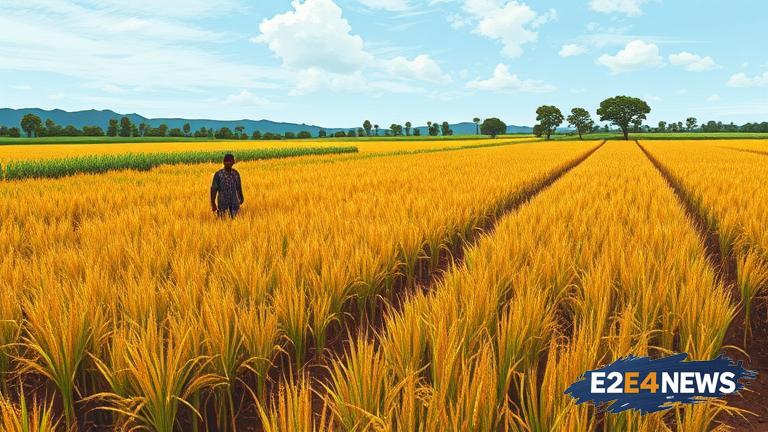Liberia, a country in West Africa, has long been dependent on imported rice to meet its food needs. However, with the launch of a new initiative, the country is taking steps towards achieving food sufficiency. The program, which focuses on improving rice production, aims to reduce Liberia’s reliance on imported rice and empower local farmers. The journey to food sufficiency begins with seeds, and the initiative is providing high-quality seeds to farmers to improve crop yields. The seeds are being distributed through a network of local farmers’ organizations, ensuring that they reach the most vulnerable communities. The initiative is also providing training and support to farmers on best practices for rice cultivation, including irrigation management and pest control. Additionally, the program is working to improve the country’s agricultural infrastructure, including the construction of new roads and storage facilities. The goal of the initiative is to increase rice production in Liberia, reducing the country’s dependence on imported rice and improving food security. The program is being implemented in partnership with local and international organizations, including the government of Liberia and the CGIAR system. The initiative is also receiving support from the private sector, with several companies providing funding and technical assistance. The rice revolution in Liberia is not only about improving food security but also about empowering local communities and promoting economic development. By supporting local farmers and improving agricultural productivity, the initiative is helping to create jobs and stimulate economic growth. The program is also promoting the use of climate-resilient rice varieties, which are better equipped to withstand the challenges of climate change. This is particularly important in Liberia, where climate change is having a significant impact on agricultural productivity. The initiative is also working to improve the nutritional content of rice, promoting the use of biofortified varieties that are rich in essential micronutrients. The program is being implemented in several counties across Liberia, with a focus on the most vulnerable communities. The initiative is also promoting the participation of women in agriculture, providing training and support to female farmers and encouraging them to take on leadership roles. The rice revolution in Liberia is a significant step towards achieving the country’s goal of becoming food sufficient. The initiative is not only improving food security but also promoting economic development and empowering local communities. With the support of local and international partners, Liberia is on the path to achieving its goal of becoming a major rice producer in the region. The program is a model for other countries in the region, demonstrating the potential for agricultural development to drive economic growth and improve food security. The initiative is also highlighting the importance of partnerships and collaboration in achieving development goals. By working together, local and international organizations can make a significant impact on the lives of vulnerable communities. The rice revolution in Liberia is a testament to the power of collective action and the potential for agricultural development to transform lives. The program is a significant step towards achieving the United Nations’ Sustainable Development Goals, particularly Goal 2, which focuses on ending hunger and achieving food security. The initiative is also promoting the use of sustainable agricultural practices, reducing the environmental impact of farming and promoting the conservation of natural resources. The rice revolution in Liberia is a success story that can be replicated in other countries, demonstrating the potential for agricultural development to drive economic growth and improve food security.
